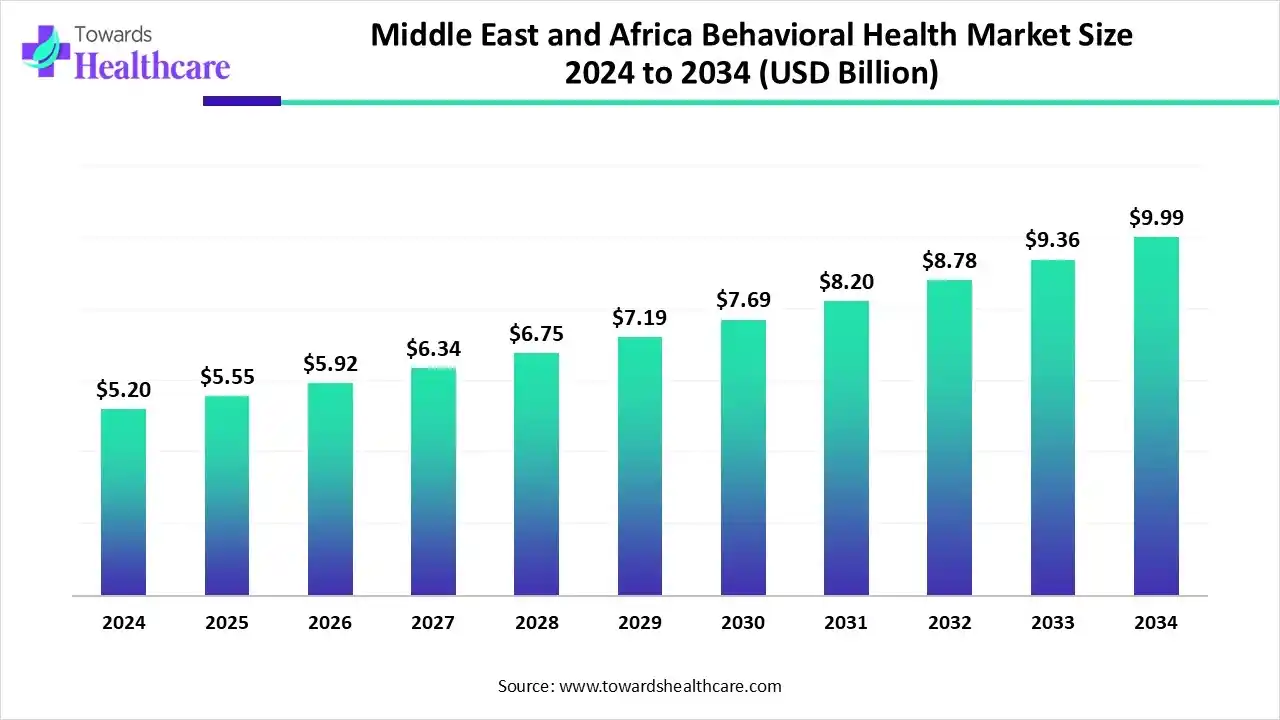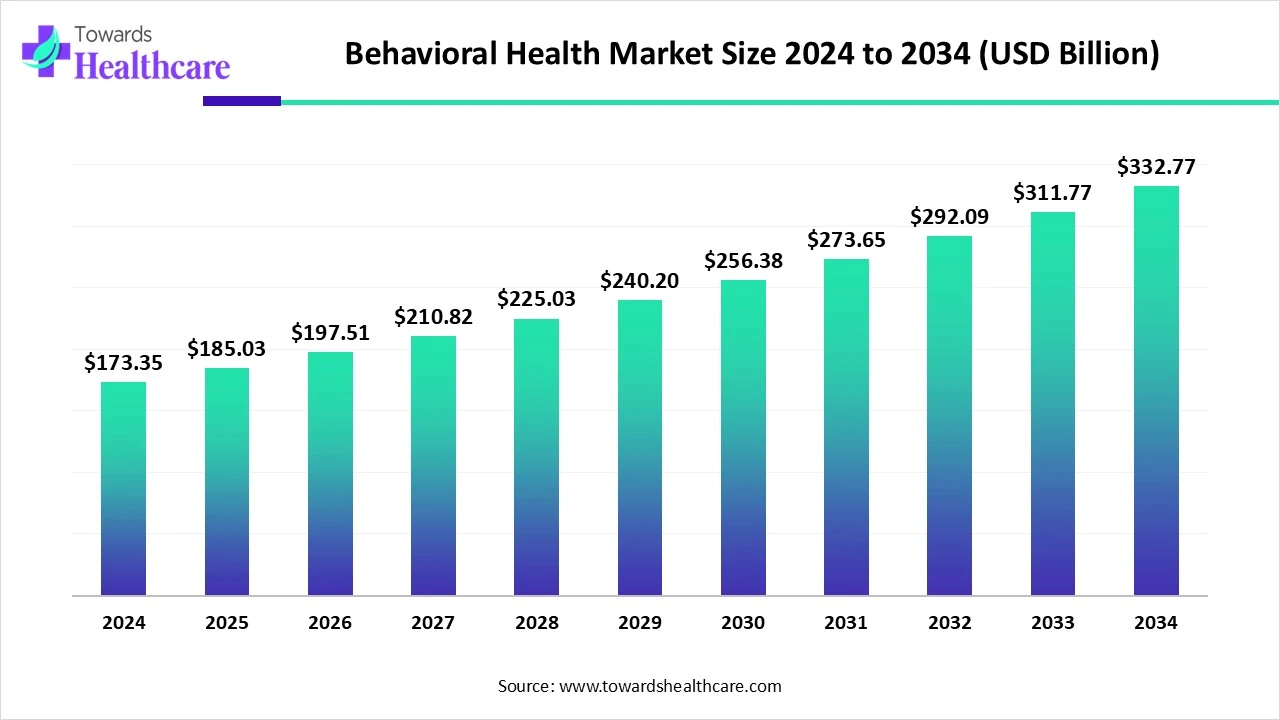February 2026

The Middle East & Africa behavioral health market size is calculated at USD 5.2 billion in 2024, grew to USD 5.55 billion in 2025, and is projected to reach around USD 9.99 billion by 2034. The market is expanding at a CAGR of 6.75% between 2025 and 2034.

The Middle East & Africa behavioral health market is rapidly expanding due to favorable government support and the increasing use of innovative approaches for managing mental health disorders. The growing geriatric population, increasing awareness of mental health, and the burgeoning medical tourism boost market growth. Artificial intelligence (AI) revolutionizes tele-psychiatry, enabling remote monitoring of patients.
| Table | Scope |
| Market Size in 2025 | USD 5.55 Billion |
| Projected Market Size in 2034 | USD 9.99 Billion |
| CAGR (2025 - 2034) | 6.75% |
| Market Segmentation | By Service Type, By Disorder Type, By Age Group, By Healthcare Setting, By Intervention Type, By Distribution Channel, By End-User, By Geography |
| Top Key Players | Aster DM Healthcare (UAE / GCC), Cleveland Clinic Abu Dhabi (UAE), Life Healthcare Group (South Africa), Groote Schuur Hospital (South Africa), Al Borg Medical Laboratories (Egypt), Cleopatra Hospitals Group (Egypt), Hospitals of the Future Group (regional network, UAE/KSA), Sheikh Khalifa Medical City (Abu Dhabi, UAE) |
The Middle East & Africa behavioral health market is experiencing robust growth, driven by growing awareness, government initiatives, urbanization, and the rising prevalence of mental health disorders. The market refers to mental health and substance use disorder prevention, diagnosis, treatment, and rehabilitation services in the MEA region. It includes hospital-based psychiatric care, outpatient counseling, community mental health centers, rehabilitation services, and emerging digital/tele-behavioral platforms, leading to accessible and culturally adapted behavioral health solutions.
AI and machine learning (ML) algorithms improve the market by enabling early diagnosis and treatment, providing personalized care. They analyze patient behaviors and suggest appropriate treatment solutions. AI-based chatbots can interact with patients and recognize early warning signs of mental health disorders. AI and ML help improve access for the growing number of patients who need care. They assist clinicians in providing proactive interventions. AI-enabled computer vision can enable imaging data analysis and understanding verbal cues.
MindTales develops digital wellness platforms that offer expert consultations and science-backed psychology exercises. It provides self-guided digital therapy courses and access to online counselling.
The Government Initiatives for Behavioral Health in the MEA Region Include:
The UAE government’s National Policy for the Promotion of Mental Health aims to develop mental health services and raise them to international levels. The policy includes promoting, developing, and expanding the scope of comprehensive and integrated mental health, as well as promoting the prevention of mental disorders.
The Saudi Arabian government’s National Program for Developmental and Behavioral Disorders (NMO) provides diagnostic, treatment, training, and rehabilitation services in an integrated manner. It aims to provide distinguished, fast, and high-quality services.
The WHO-UNICEF Joint Programme announced plans to integrate Mental Health and Psychosocial Support (MHPSS) into Kuwait’s primary healthcare for children, adolescents, pregnant women, and new mothers. This includes promoting MHPSS within government systems, securing funding for care model development, and using digital technology.
By service type, the outpatient counseling services segment held a dominant presence in the market in 2024, due to the increasing number of employed people and cost-effectiveness. Outpatient services provide high-quality, flexible solutions to patients with mental health disorders, eliminating the need to stay overnight. This saves exorbitant healthcare costs, reducing economic burden on patients and their families. Outpatient services allow patients to receive assistance according to their schedules.
By service type, the home-based treatment services segment is expected to grow at the fastest CAGR in the market during the forecast period. The increasing geriatric population and the growing demand for remote monitoring boost the segment’s growth. Technological advancements enable psychiatrists to carry their portable devices to patients’ homes. Healthcare professionals can offer friendly and professional treatments in bright, welcoming surroundings.
By disorder type, the depression & mood disorders segment held the largest revenue share of the market in 2024, due to the rising prevalence of mood disorders and sedentary lifestyles. The cases of depression, especially among adolescents and adults, are increasing due to genetic factors and rising stress levels. According to Egypt’s Ministry of Health and Population, approximately 5.7% of the total population suffers from depression.
By disorder type, the substance use disorders segment is expected to grow with the highest CAGR in the market during the studied years. Substance use disorder affects a person’s brain and behavior due to an inability to control the use of a legal or illegal drug. The illegal drugs include alcohol, marijuana, and nicotine. According to the 2024 World Drug Report, approximately 6.7% of the population in the Mediterranean region suffers from drug use disorders.
By age group, the adults segment contributed the biggest revenue share of the market in 2024, due to the higher stress levels among adults. Adults face multiple life-challenging moments, such as unemployment, divorce, dealing with an illness, and family difficulties. They require behavioral health services to address conditions like depression and anxiety, improving their well-being. Behavioral health enhances the productivity of adults.
By age group, the children & adolescents segment is expected to expand rapidly in the market in the coming years. The increasing peer pressure in the vicinity and the rapidly evolving physical, emotional, and social changes potentiate the chance of mental health disorders among children and adolescents. Behavioral health treatment among the younger population can prevent long-term problems.
By healthcare setting, the hospitals & specialty clinics segment led the market in 2024, due to the availability of favorable infrastructure and suitable capital investments. This enables hospitals & specialty clinics to adopt advanced technologies for behavioral health. Hospitals & specialty clinics provide multidisciplinary and personalized expertise and care to patients. They are also part of clinical trials benefiting patients by receiving innovative treatments.
By healthcare setting, the online/tele-behavioral health platforms segment is expected to witness the fastest growth in the market over the forecast period. Online platforms eliminate the need for a patient to visit a healthcare setting, saving travel time and costs. They enable patients to perceive behavioral health treatment from any professional, irrespective of their geographical location.
By intervention type, the medication management segment accounted for the highest revenue share of the market in 2024, due to growing research activities and the need for effective treatment. Researchers develop novel medications for providing personalized treatment to patients based on their conditions. Medications relieve and alleviate symptoms by influencing brain chemicals, improving mood, and enhancing quality of life. They are comparatively cost-effective than other treatment regimens.
By intervention type, the cognitive behavioral therapy (CBT) segment is expected to show the fastest growth over the forecast period. Mental health disorders affect the cognitive functioning of patients, resulting in decreased productivity. CBT acts as a synergistic therapy, along with medications, to improve mental well-being. It helps manage symptoms, learn new techniques, deal with grief, and overcome emotional trauma.
By distribution channel, the public healthcare system segment held a major revenue share of the market in 2024, due to favorable government support and affordability. Public healthcare systems are government-funded and provide behavioral health services at almost negligible rates. This benefits people from low- and middle-income groups, increasing the accessibility of behavioral health to a wider population.
By distribution channel, the online/digital platforms segment is expected to account for the highest growth in the upcoming years. Online platforms facilitate patients and healthcare professionals to purchase high-quality equipment/medications for behavioral health from a wide range of options. The burgeoning e-commerce sector and advancements in connectivity technologies propel the segment’s growth.
By end-user, the patients & families segment registered its dominance over the global market in 2024, due to increasing awareness among the general public and the rising disposable incomes. Government bodies play a vital role in creating awareness about mental health disorders through TV programs and social media. Mental health campaigns and government hospitals enhance the affordability of behavioral health.
By end-user, the employers & corporates segment is expected to grow swiftly in the foreseeable future. Employers are becoming aware of managing the mental health of their employees. The growing demand for work-life balance and the need to create supportive workplaces foster the segment’s growth. Additionally, employers invest heavily in employee health programs that promote behavioral health services.
The increasing prevalence of mental health disorders, favorable government support, and the rising adoption of advanced technologies are the major factors that contribute to market growth in the Middle East & Africa. People are becoming aware of symptoms of mental health disorders and their interventions. The presence of key players and the increasing investments boost the market. The growing demand for personalized care promotes the use of telemedicine and remote monitoring.
Countries like Jordan, Oman, Kuwait, and Qatar constitute over double the global average of 5% of the total disease burden. Behavioral health services are supported by several government initiatives of GCC countries, including Saudi Arabia’s Vision 2030 and the UAE’s National Strategy for Wellbeing 2031. The Abu Dhabi government launched its own framework and recorded a 30% increase in people receiving treatment for mental health conditions.
The South African government conducts mental health awareness campaigns and encourages people to seek professional support for their mental well-being. It also collaborates with the WHO to address barriers in behavioral health. The increasing depression cases also potentiate the demand for behavioral health, accounting for approximately 30 million people suffering from depression in Africa.
The global behavioral health market is valued at US$ 173.35 billion in 2024, rising to US$ 185.03 billion in 2025, and is expected to reach approximately US$ 332.77 billion by 2034. This growth represents a CAGR of 6.74% from 2025 to 2034.

By Service Type
By Disorder Type
By Age Group
By Healthcare Setting
By Intervention Type
By Distribution Channel
By End-User
By Geography
February 2026
January 2026
January 2026
December 2025
